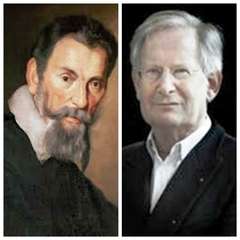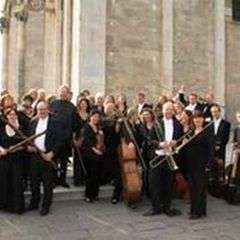|
Back
The Gardiner/Monteverdi Condition humaine New York
Alice Tully Hall
10/19/2017 -
Claudio Monteverdi: Il ritorno d’Ulisse in patria
Furio Zanasi (Ulisse), Marianna Pizzolato (Penelope), Krystian Adam (Telemaco), Hana Blazíková (Minerva, Fortuna), Gianluca Buratto (Il Tempo, Nettuno, Antinoo), Michal Czerniawski (Pisandro), Gareth Treseder (Anfinomo), Zachary Wilder (Eurimaco), Anna Dennis (Melanto), John Taylor Ward (Giove), Francesca Boncompagni (Giunone), Robert Birt (Iro), Francisco Fernández-Rueda (Eumete), Carlo Vistoli (Umana Fragilitá), Silvia Frigato (Amore), Francesca Biliotti (Eeiclea)
Monteverdi Choir, English Baroque Soloists, Sir John Eliot Gardiner (Conductor, Co-director)
Elsa Rooke (Co-Director)

C. Monteverdi/Sir J. E. Gardiner (© Courtesy of the artist)
“We are never at home, we are always beyond ourselves.”
Essayist Michel de Montaigne (1533-1593)
Montaigne, Shakespeare and Monteverdi overlapped each other in years, may have known of each other (Shakespeare certainly read a translation of Montaigne), and one factor certainly united them. Their passion for the human condition. Not the Church, not sacred judgments or relation with the Infinite. Their arts were obsessed with the infinite diversity of people.
And for Monteverdi’s first Venetian opera, The Return of Ulysse to his Homeland, he took a static situation–Ulysses waiting and waiting to be re-united with his faithful wife Penelope–to create a panoply of that Human Condition. Like Homer’s great drama, they were serious and funny, faithful and traitorous, hilarious and gloomy. They may have been influenced by gods and goddesses, but they were as free, daring and adventurous as...
Well, as 17th Century Venetians.
And the joy, the greatness, the absolute delight in John Eliot Gardiner’s production last night was how he humanized his cast, how his musicians and singers reached out for the greatest emotional effects. And oh, how the composer would have prized that.
The duration of the opera, over three hours, was of Wagnerian length (though one prefers Schumann’s adjective “heavenly” length.) Yet from the very first seconds of the opera, a scene not included in the original, Mr. Gardiner transformed music into pure emotions.
This dumb-show, a prologue before the Prologue, showed two elderly people embrace each other, he turns, she waves, he looks back once and then trudges off the stage while she looks longingly stares.
This was Ulysses going off to Troy, to fight his great battle. Then, as Homer would tell it, after the victory he was blown off course for maybe months or years before returning to his homeland. This while Penelope, at her spinning wheel, resisted the suitors, and waited for her husband to return.
And this was the chore of Monteverdi with his aphoristic librettist Giacomo Badoaro, as reincarnated by Gardiner, his dazzling English Baroque Orchestra (with their heavenly duets of recorders, trumpets and strings) and the stage of Alice Tully Hall.
That stage, even in this semi-dramatized form, was transformed to a remote island, a banqueting hall, a scene of carnage and fornication, of romance and viciousness. And somehow, in this an opera uncut by the conductor, sung with an international cast, made us never doubt that this was true.
How was this done? Partly the costumes. Mortals wore ordinary clothes, gods and goddesses wore more formal Greek ware. We needed no props. Even the finale bow and arrow were mimed brilliantly: Penelope’s arms were the bow–mimed or divinely directed by Minerva in the background. The carnage needed no arrows, for the suitors were hustled off the stage as if pushed by a demonic Nemesis.
Partly the direction. Nothing was still in this drama. The characters appeared on all sides of the stage. They were single or double. A bacchanal of a party was sung and danced on the back of the stage concurrently with a bereft Penelope at the front, alone her loneliness. We could have a solo monologue–the Falstaffian Irus bewailing his fate with the orchestra (being consoled by conductor Gardiner) or a funereal chorus in dinner suits toward the end.
Always movement, but movement with a purpose.
And of course the music. Unlike Orfeo or even the later Poppea, this opera had fewer recitatives, more melodies, duets, madrigals, choruses. In other words, nobody had to patronize Ulysse as “the birth of Opera.” This was not a primitive creation, it was Venus full-created. The movements, the melodies were not stylized (any more than any other opera). They were part of a drama which was as touching and emotional as Sophocles or Shakespeare or the late Sam Shepard.
The entrancement was magnified most of all by a credo from John Eliot Gardiner. The credo of pushing the drama, never allowing anything to be whispered or prissy or “Baroque”. Sir John’s credo was illustrated forth in his monumental book on Johann Sebastian Bach. To that writer, Bach was shown at his most “Bachian” in the cantatas, which are so dramatic, so theatrical.

English Baroque Soloists (© Courtesy of the Artists)
And this is what we had here. The English Baroque Soloists was never correct or prudish. Those brasses sung out when necessary, the flutes tootled, the whole orchestra was bang-on. The Monteverdi Choir danced their way through their few scenes, they were clear and articulate in their Italian. I don’t know (nor does anybody know in Monteverdi’s skeleton score) the size of the original chorus. But long before his operas, Monteverdi understood the beauties of the human voice, and Sir John pushed it to the ultimate.
We had so many soloists in this massive cast that it would be unfair to point to a few. Yet one could never imagine Sir John choosing any voice which was not rich, lustrous, melodic. Of course Furio Zanasi, not as the traditional heroic Ulysses, but the woebegone beachcomber, the beggar, a Fifth-Act Lear, with such a glorious voice. And his wife, Marianna Pizzoloato, resembling Queen Victoria, a bit dowdy, but the true tragic character.
One cannot say enough about the sensuality of lovers Anna Denis and Zachary Wilder. Sir John and co-director Elsa Rooke easily eschewed the “No sex please, we’re British” in a virtual stage fornication for the two. Krystian Adam pranced around a bit too much as Telmachus, but we perfectly fine as the rambunctious son.
And then we come to the overweight Falstaff here, Robert Burt., He does have the funniest line in this play, when shepherd Francisco Fernández-Rueda warbles on about the joys of his pastoral animals.
“I,” says the ravenous Mr. Burt, “eat your companions.”
He also has that overlong (but still entrancing) monologue about his woes, which could have come directly from Merry Wives of Windsor. It was a showpiece, to be sure, but a delightful one.
While I would go along with Sir John’s refusal to cut a single line from the opera, the massive scenes after the death of the suitors before the reconciliation, do take away from the suspense of the drama. Neither Shakespeare’s “gate-knocker” or “grave-digger” were placed near the climax of Macbeth or Hamlet.
But so be it. And in the finale, where the chaste wife and husband back from his travels, join hands for a final short duet, one can forgive any structural problems.
For this was an opera which opened up a world both Ancient, Venetian and Modern, One wished that Monteverdi in his long life has taken on Bocaccio, just as we might dream of Shakespeare doing Chaucer. But never mind that. Seeing and hearing Monteverdi’s own versuibn Homer was epic enough. The discovery of this rarely-produced opera was like Penelope’s discovery of her husband. In the words of Montaigne, “a joy which is both joyous and profound.”
Harry Rolnick
|